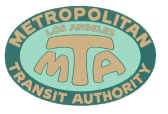Los Angeles Metropolitan Transit Authority
 |
|
| Overview | |
|---|---|
| Locale | Los Angeles |
| Transit type |
Streetcar Interurban Local bus (including trolleybuses) Bus rapid transit |
| Number of lines | 10 Light rail -- Bus routes |
| Number of stations | -- Rail |
| Daily ridership | -- (Weekdays) |
| Operation | |
| Began operation | July 24, 1951 |
| Operator(s) | Los Angeles Metropolitan Transit Authority |
| Technical | |
| System length | Rail – 0 miles (0 km) Bus – 0 miles (0 km)2 |
| Track gauge |
4 ft 8 1⁄2 in (1,435 mm) (standard gauge) 3 ft 6 in (1,067 mm) Narrow gauge |
The Los Angeles Metropolitan Transit Authority (sometimes referred to as LAMTA or MTA I) was a public agency formed in 1951. Its original mandate was to do a feasibility study for a monorail line which would have connected Long Beach with the Panorama City district in the San Fernando Valley via Downtown Los Angeles.
The agency's powers were expanded in 1954, authorizing it to study and propose an extensive regional transit system. In 1957, another expansion of the agency's powers authorized it to operate transit lines, and it subsequently purchased the bus and streetcar lines then being operated by Metropolitan Coach Lines, which had taken over passenger service of the Pacific Electric Railway in 1951, as well as the bus and streetcar lines of the Los Angeles Transit Lines, successor to the Los Angeles Railway. The MTA began operating the lines on March 3, 1958, and continued to do so until the agency was taken over by the Southern California Rapid Transit District on November 5, 1964.
During the MTA's tenure, the last remaining rail transit lines in Los Angeles were abandoned and replaced with bus service, the last former Pacific Electric line in April 1961, and the last former Los Angeles Railway lines in 1963.
...
Wikipedia
